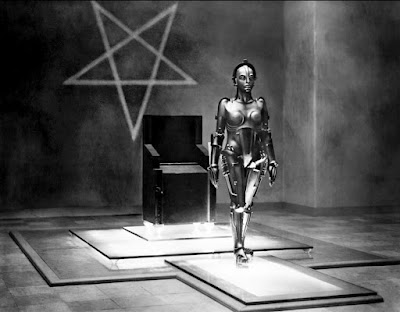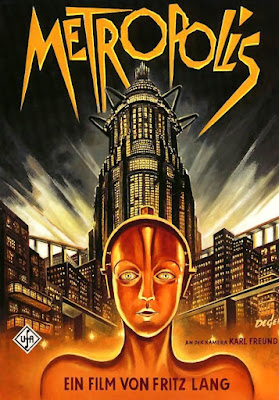This weekend brings a triple-header of silent films programs with live music by me.
On Saturday, Feb. 4, it's Harold Lloyd's 'The Kid Brother' (1927) plus a pot luck supper at the Campton (N.H.) Historical Society. More details on this annual event in the press release below.
Then on Sunday, Feb. 5, the Somerville Theatre in Somerville, Mass. will lauch this year's 'Silents, Please!' series with Oscar Micheaux's 'Within Our Gates' (1920), to be screened in honor of Black History Month.
Then on Monday, Feb. 6, it's Alfred Hitchcock's silent thriller 'The Lodger' (1927) at the Garden Cinema in Greenfield, Mass. By the way, a nice feature on the Garden's silent film series recently ran in the Greenfield Recorder.
First, a tip of the porkpie hat to everyone who attended yesterday's screening of Buster Keaton's 'College' (1927) at the Town Hall Theatre in Wilton, N.H.
It wasn't quite a full house. But it was close enough to create the kind of energy that helps amps up audience response. That's what turns a silent film screening into a memorable event, which is what happened Sunday afternoon.
I mean, an audience doesn't have to react. But I must say, it was great to hear people roaring at Keaton's antics, first in 'Cops' (1922) and then in 'College,' (1927). Laughter has a way of making everyone happy—accompanist included.
Hope you'll join us on Saturday, Feb. 4 for another great comedy: Harold Lloyd's 'The Kid Brother' (1927), newly in the public domain and served up with a pot luck supper. Details below!
* * *
WEDNESDAY, JAN. 25, 2023 / FOR IMMEDIATE RELEASE
Contact Jeff Rapsis • (603) 236-9237 • jeffrapsis@gmail.com
Silent comedy masterpiece 'The Kid Brother' to screen with live music in Campton, N.H. on Saturday, Feb. 4
Dinner
and a movie: family-friendly Harold film is featured attraction of
local historical society's annual pot luck supper; public welcome
CAMPTON,
N.H.—He was the most popular film star of the 1920s, routinely
outpacing comic rivals Charlie Chaplin and Buster Keaton at the box
office.
He was Harold Lloyd, the boy next door who could wind up
hanging from the hands of a clock high atop a skyscraper. Audiences
loved Lloyd's mix of visual comedy and thrilling adventures, making him
one of the most recognized icons of early Hollywood.
See for
yourself when 'The Kid Brother' (1927), a feature-length film regarded
as Lloyd's masterpiece, is screened by the Campton Historical Society on
Saturday, Feb. 4.
The event, which is free and open to all, takes place at Old Campton Town Hall, 529 Route 175, Campton, N.H.
It starts with a pot luck dinner at 5 p.m., with the film program to begin at 6 p.m.
Those attending the pot luck dinner are asked to bring one of the following: soup, bread, salad, main dish, dessert or beverage.
Music during the pot luck will be played by members of the Fiddlehead Field Kids Orchestra.
Live music for the silent film program will be provided by silent film accompanist Jeff Rapsis.
In
'The Kid Brother,' meek country boy Harold Hickory (Lloyd) looks up to
his tough father, but is overshadowed by two burly older brothers. When a
traveling circus brings trouble to town and possible disgrace to the
Hickory clan, can Harold save the family name?
From that simple
situation, Lloyd weaves a roller coaster of a tale that critics and film
historians say show him at the height of his powers as a filmmaker and
comedian.
"The first silent film I ever saw that made me actually
stand up and cheer," wrote critic Steven D. Greydanus of The Decent
Films Guide. "As a first introduction to silent film, I would pick 'The
Kid Brother' over the best of Chaplin or Keaton every time."
"Unlike
Chaplin’s Little Tramp, who was as much defined by his bizarre
eccentricities as his bowler and cane, Lloyd’s character, with his
trademark spectacles, was an instantly likable, sympathetic
boy-next-door type, a figure as winsome and approachable as Jimmy
Stewart or Tom Hanks," Greydanus wrote.
The film co-stars Jobyna Ralston, Walter James, Eddie Boland, and Constantine Romanoff.
Harold
Lloyd, along with Chaplin and Keaton, stands as one of the three
masters of silent comedy. Though Lloyd's reputation later faded due to
unavailability of his movies, the recent re-release of most of his major
films on home media has spurred a reawakening of interest in his work
and a renewed interest in theatrical screenings.
"Seeing a Harold
Lloyd film with live music and an audience is one of the great
experiences of the cinema of any era," said Jeff Rapsis, a New
Hampshire-based silent film musician who will accompany the film.
"Films
such as 'The Kid Brother' were designed for a specific environment. If
you can put those conditions together again, you can get a sense of why
people first fell in love with the movies," Rapsis said.
'The Kid
Brother' will be screened with live music on Saturday, Feb. 4 at 6 p.m.
at Old Campton Town Hall, 529 Route 175, Campton, N.H.
The film
will follow a pot luck supper that starts at 5 p.m. Those attending the
pot luck dinner are asked to bring one of the following: soup, bread,
salad, main dish, dessert or beverage.
Music during the pot luck supper will be provided by the Fiddlehead Field Kids Orchestra.
The event is free and open to all, with donations accepted to support the Campton Historical Society.
For more information, visit www.camptonhistorical.





















